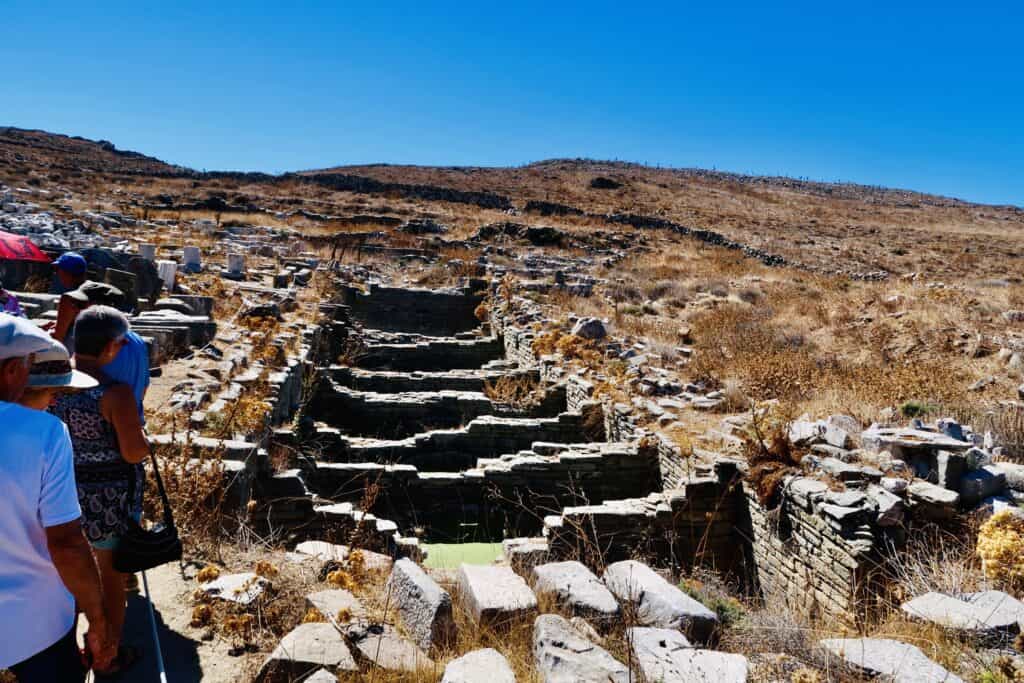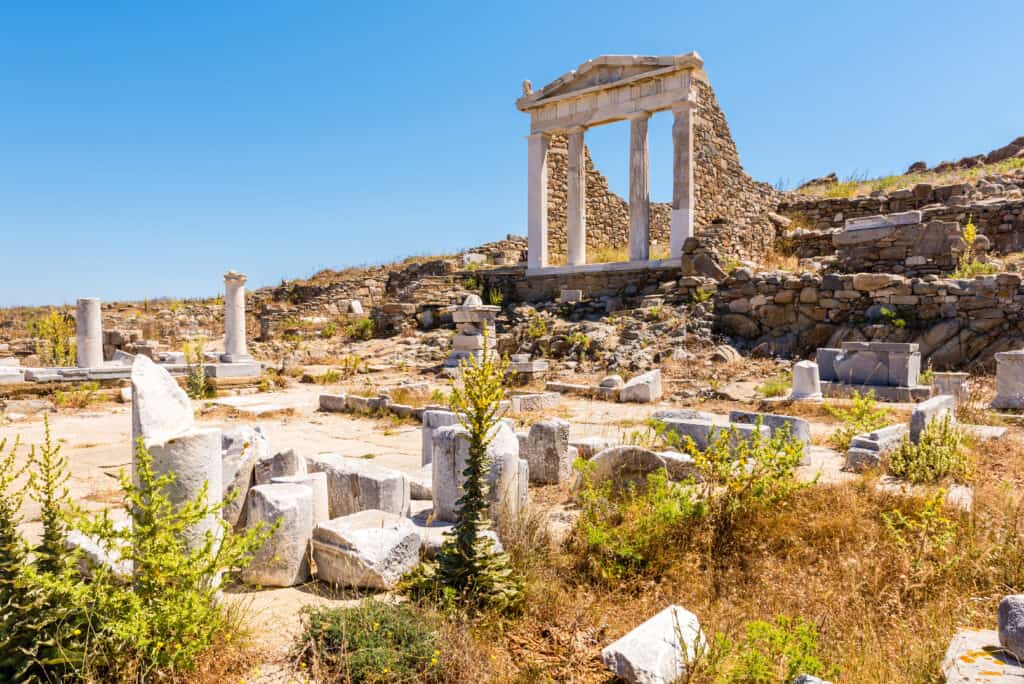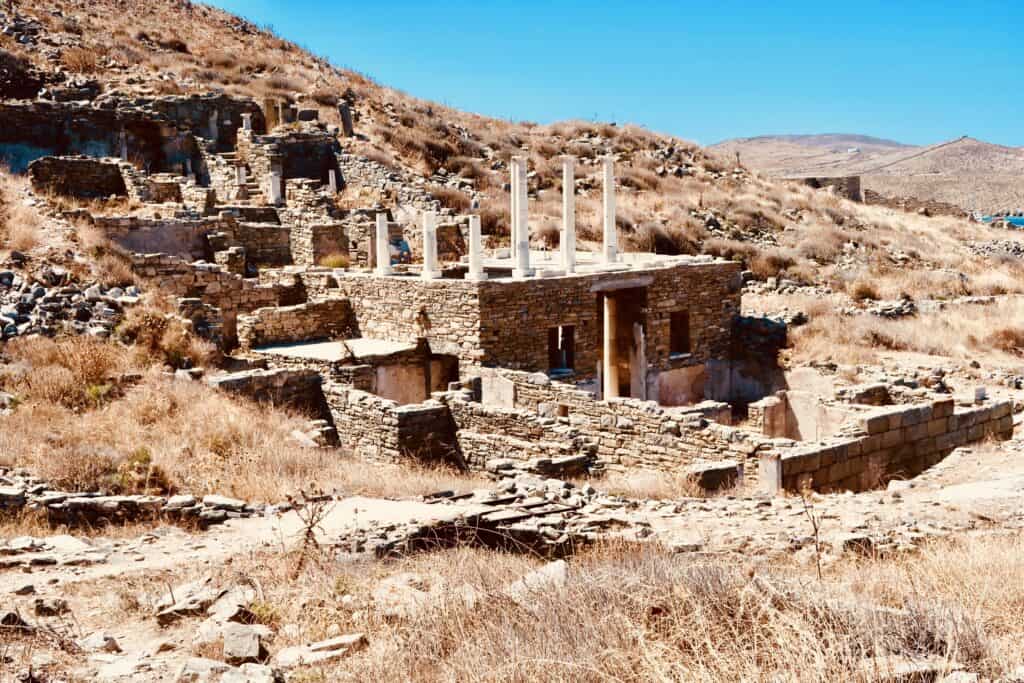Is Delos Worth Visiting? A Complete Travel Guide for 2023

Nestled in the azure embrace of the Aegean Sea near Mykonos, the tiny yet historically significant island of Delos is a treasure trove of archeological finds. Steeped in mythology and ancient marvels, Delos stands as a living testament to the rich tapestry of human civilization that once thrived on its shores.
But amidst the abundance of tourist destinations, one question remains: Is Delos truly worth visiting? I visited this island recently, and as a serious history buff, I could have spent days there – really! In this blog post, I will give you an overview of this ancient sacred island.
By the end of this post, you will discover whether Delos is a destination that lives up to its illustrious reputation and merits a place on your bucket list.
The History of Delos Island
The sacred island of Delos holds an exceptional significance in history due to its deep-rooted role as a cultural and religious center in the times of ancient Greece. Located in the heart of the Aegean Sea, the island’s strategic position made it a crucial hub for trade and commerce between civilizations, fostering cultural exchanges that shaped the course of history.
From around the 3rd millennium BCE, Delos became a major player in the maritime trade network of the Eastern Mediterranean, attracting merchants and travelers from all corners of the ancient world. The island’s flourishing trade routes made it a melting pot of cultures, where ideas, beliefs, and artistic influences mingled, leaving a lasting impact on the development of human civilization.
In Greek mythology, Delos is believed to be the birthplace of Apollo and Artemis, twin deities revered as gods of the sun and moon, music, hunting, and childbirth. This sacred association elevated Delos to a central religious sanctuary in the ancient Greek world.

The island’s religious significance grew exponentially, leading to the construction of magnificent temples, altars, and sacred precincts dedicated to the worship of these divine siblings. The Delian festivals, celebrated with grandeur every four years, attracted pilgrims and participants from various Greek city-states, further solidifying Delos as an essential center of religious devotion and cultural unity.
What I found interesting when visiting Delos, is that it became a religious center for ALL beliefs in the region. This includes the religions of the Jews, Persians, later Christians, Egyptians, and many more. This makes the history of Delos quite unique when compared to the rest of the world in ancient times.
Delos’ historical importance extends beyond its religious and commercial significance. In the 5th century BCE, during the Golden Age of Athens, the island served as the headquarters for the Delian League, an alliance of Greek city-states led by Athens. This alliance played a pivotal role in resisting Persian invasions and promoting democratic ideals across the region.
However, over time, the Delian League transformed into a dominion of Athens, leading to conflicts and eventually contributing to the downfall of the Athenian Empire. These events marked a turning point in ancient Greek history, with Delos serving as a backdrop to complex political dynamics that shaped the fate of powerful civilizations.
Despite its illustrious past, Delos eventually faced decline and abandonment. Ongoing piracy and shifting trade routes led to the island’s gradual downfall, and it fell into obscurity during the Hellenistic and Roman eras.
Today, Delos stands as a captivating archaeological site, a UNESCO World Heritage Site, and a window into the history of the ancient world. Preserved ruins, including impressive temples, marketplaces, and residential areas, continue to unravel the island’s historical significance, offering invaluable insights into the cultural, religious, and political dynamics that have shaped humanity’s journey through the ages.
Ancient Delos Tour
With a local guide, uncover the myths and legends of ancient Greece in this informative tour of Delos. Depart from Mykonos with a historian guide to learn all about sites such as:
- The Temple of Apollo
- Sanctuary of Artemis
- Museum of Delos
…and much more!
You can add lunch to your tour as well as a tour of Old Mykonos Town.
Why Visit Delos | Impressive Ruins and the Museum
The 21 Most Important Sites on Delos Island
Delos is an archeological site full of ruins – in fact in is completely uninhabited today, and has been since the 7th century AD. Amongst the ancient ruins that sprawl across the island, ten sites stand out as the most important, each offering a captivating glimpse into the island’s illustrious past.
From the majestic Temple of Apollo, dedicated to the god of the sun and music, to the iconic Terrace of the Lions, representing Delos’ sacred protection, and the well-preserved House of the Dolphins, showcasing ancient luxury, these sites paint a vivid portrait of the island’s prominent role as a center of culture, trade, and spirituality in the ancient Mediterranean world.
Here is a short overview of the top 21 most important sites found on Delos Island:
1 | Temple of the Delians: Built in the 5th century BCE, this was a grand sanctuary dedicated to Apollo and Artemis. It was the island’s principal sanctuary, and therefore had a vital role in hosting Delian festivals.
2 | Terrace of the Lions: An iconic row of marble lions, originally a gift from the island of Naxos, lining the Sacred Way leading to the Temple of Apollo, symbolizing the island’s sacredness and protection.

3 | House of the Dolphins: A well-preserved ancient mansion with intricate mosaic floors and beautiful frescoes, offering a glimpse into the affluent lifestyle of the island’s ancient inhabitants.
4 | Sacred Lake: A natural water reservoir on Delos believed to be the birthplace of Artemis, the goddess of the moon, hunting, and childbirth, adding to the island’s sacred aura.
5 | Theater Quarter: Comprising several interconnected theaters, this area hosted cultural and artistic performances, underscoring Delos’ significance as a hub of ancient Greek arts.

6 | Terrace of the Foreign Gods: A sacred area dedicated to the worship of deities from various cultures, a symbol of Delos’ role as a melting pot of religious diversity and cultural exchange.
7 | Agora of the Competaliasts: A marketplace where merchants from different regions gathered to trade goods, showcasing Delos’ pivotal role in ancient Mediterranean commerce.
8 | Avenue of the Lions: A prominent avenue flanked by marble lions, leading visitors from the Sacred Harbor to the heart of the island’s religious sanctuaries.
9 | Mount Kynthos: The highest point on Delos, offering panoramic views of the island and surrounding Aegean Sea, and believed to be the birthplace of Zeus, the king of the gods, according to local legend.
10 | House of Dionysus: The House of Dionysus at Delos is an ancient residential complex that holds a special place among the island’s archaeological treasures. This well-preserved structure is believed to have been constructed in the 2nd century BCE and is adorned with stunning mosaics depicting scenes of Dionysian revelry.

11 | The Minoan Fountain: A fascinating ancient water system showcasing advanced engineering, reflecting the island’s efforts to manage its precious water resources.
12 | House of Cleopatra: Named after a prominent Delian citizen, this opulent residence boasts intricate mosaics and exquisite frescoes, offering insight into the island’s affluent society.
13 | The Stoa of Philip: An impressive colonnaded walkway built by King Philip V of Macedon, serving as a testament to Delos’ political and strategic significance during the Hellenistic period.
14 | The Sanctuary of Dionysus: A revered religious site dedicated to Dionysus, the god of wine and revelry, where festive celebrations and rituals once took place.
15 | The Sacred Precinct of Artemis: A sacred area dedicated to Artemis, the twin sister of Apollo, with remnants of altars and offerings, preserving the island’s religious prominence.
16 | The Roman Agora: A bustling marketplace dating back to Roman times, where merchants gathered to exchange goods, attesting to Delos’ continued importance in trade even after its decline.
17 | The Gymnasium: An ancient sports complex where young men would engage in physical exercises and intellectual pursuits, reflecting the island’s emphasis on education and athleticism.
18 | The Propylaea of the Sanctuary of Apollo: A monumental entrance gateway leading to the Temple of Apollo, a testament to the grandeur of Delos’ religious architecture.
19 | The Sacred Harbor: Once a bustling port teeming with ships from all corners of the ancient world, the Sacred Harbor was a gateway to Delos’ rich cultural and commercial exchanges.
20 | Temple of Isis: Dating back to the 2nd century BCE, this temple was dedicated to the Egyptian goddess Isis, the temple’s unique blend of Egyptian and Greek architectural styles reflects Delos’ role as a hub for religious syncretism and cultural exchange in the ancient Mediterranean world.

21 | Synagogue at Delos: Built around the 2nd century BCE, it is one of the oldest synagogues found in Greece, attesting to the presence of a Jewish community on Delos during ancient times. The synagogue’s location within the heart of Delos’ commercial and religious center further highlights its significance as a hub of trade and cultural interaction.
The Archeological Museum of Delos
The Museum on Delos Island is a captivating repository of archaeological treasures that offers visitors a fascinating glimpse into the island’s rich history and cultural heritage. The island’s museum is located near the ancient port. It houses a vast collection of artifacts that were excavated from the island’s archaeological sites.
The exhibits include ancient statues, pottery, sculptures, mosaics, and religious relics, all meticulously curated to showcase the island’s pivotal role as a prominent center of trade, religion, and culture in the ancient Mediterranean world.
The museum provides an immersive experience, allowing visitors to connect with the ancient civilizations that once thrived on Delos and gain insights into their daily lives, artistic expressions, and religious practices. The artifacts on display offer a vivid representation of the island’s diverse history, including its association with Greek mythology, the Delian League, and its eventual decline and abandonment.
The museum’s well-designed layout and informative displays complement the awe-inspiring archaeological sites found across Delos, creating a comprehensive and enlightening journey through the island’s intriguing past.

How to Visit Delos Island
There are two primary ways that you can visit Delos Island. Note, you will have to take a ferry (whether public or private) to reach Delos, as it is an island.
Delos Tour from Mykonos
The absolute best way to explore the island is to take a guided tour of Delos. There is so much context that could be lost without someone there to bring to life the ancient people who lived there. This Ancient Delos Tour is a half-day tour of Delos, and includes hotel pickup and the ferry ride over to the island. In addition to covering Delos, you can also upgrade your tour to include a lunch and a walking tour of Mykonos Old Town.

Ferry to Delos
To reach Delos Island from Mykonos Town, you can take a ferry from the Old Port of Mykonos. There are regular ferry services that operate between Mykonos and Delos, offering convenient transportation options for visitors. The ferry ride typically takes around 30 minutes, allowing you to enjoy a short and scenic journey across the Aegean Sea to this historically significant destination. Please check the ferry schedules in advance, as they may vary depending on the season and weather conditions. Click here for ferry ticket information.
Frequently Asked Questions about Delos Island
Delos is considered sacred due to its association with Apollo and Artemis, revered as gods of the sun, moon, music, and hunting in Greek mythology. As the mythical birthplace of these deities, the island became a central religious sanctuary, attracting pilgrims from across the ancient world. Its unique status as a place where no one was born or died, according to an oracle’s decree, further enhanced Delos’ religious significance.
Delos Island is known for being one of the most important archaeological sites in Greece. It holds great religious importance as the mythical birthplace of Apollo and Artemis, attracting pilgrims and worshippers in ancient times. Delos is also renowned for its role as a prominent center of trade and commerce in the ancient Mediterranean, fostering cultural exchanges that shaped the course of human civilization.
In Greek mythology, Delos was the only island that allowed Leto, the mother of Apollo and Artemis, to give birth because it was a neutral and uninhabited land. The island’s divine association with Apollo and its promise to be a place where no one was born or died, according to an oracle’s decree, ensured the safety of Leto during childbirth.
Yes, you can visit Delos on your own. The island is open to the public, and visitors can take a ferry from Mykonos to Delos and explore the archaeological site independently. However, it is essential to note that guided tours are also available and highly recommended as they offer valuable insights into the island’s history, culture, and mythology.
Delos is important in history due to its significant role as a cultural, religious, and commercial hub in the ancient Mediterranean world. Its association with Greek mythology as the birthplace of Apollo and Artemis elevated the island’s religious prominence and attracted pilgrims and worshippers. Moreover, Delos served as a center of trade, fostering cultural exchanges and economic prosperity during its peak.
In Conclusion | Is Delos Worth Visiting?
I hope that this detailed post has demonstrated why Delos is worth visiting. From the well-preserved ancient ruins, to the onsite museum, it is easy to see why Delos is a most popular attraction for those who are visiting Mykonos. This tiny island is packed full of things to do, and would be of particular interest to anyone who loves to explore history while traveling.



